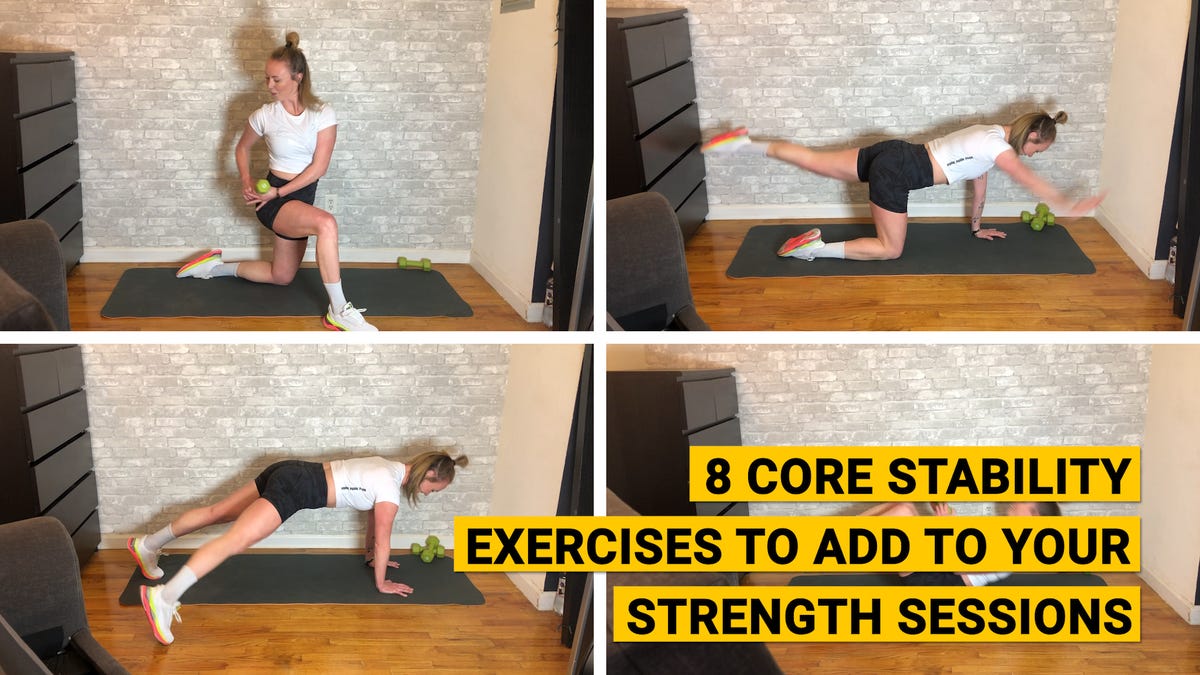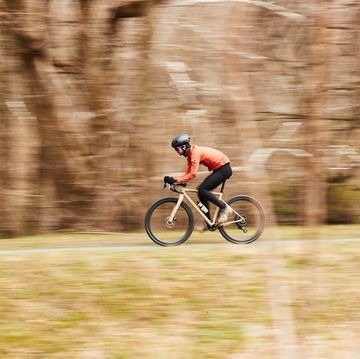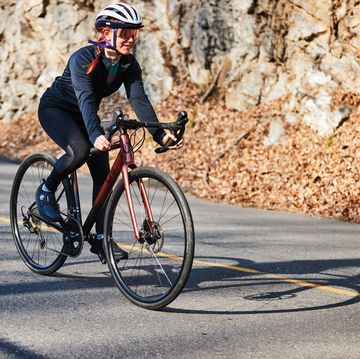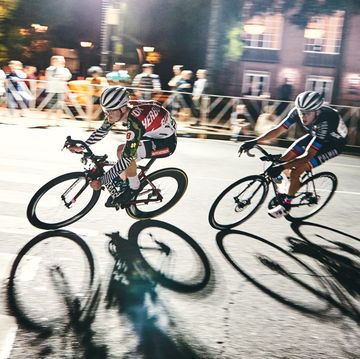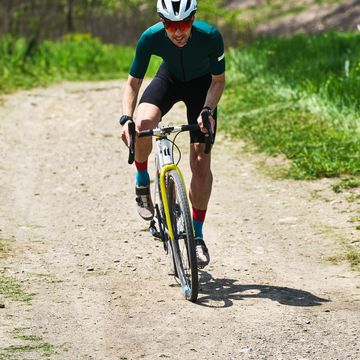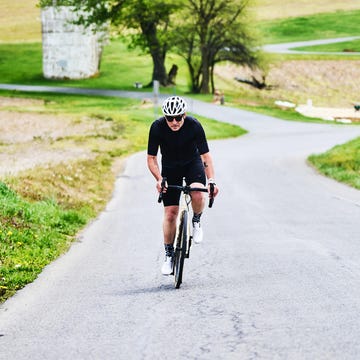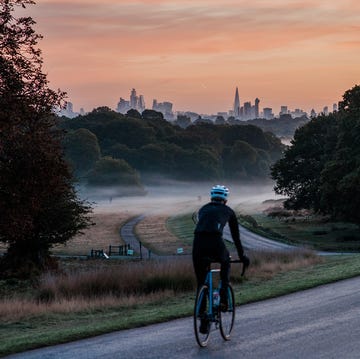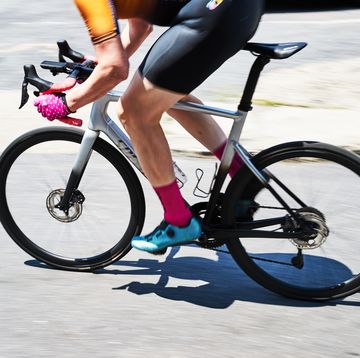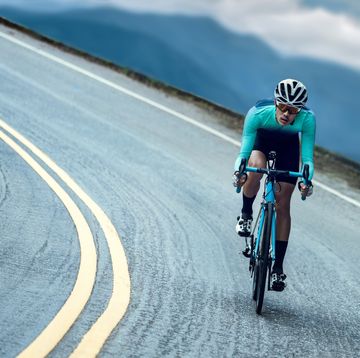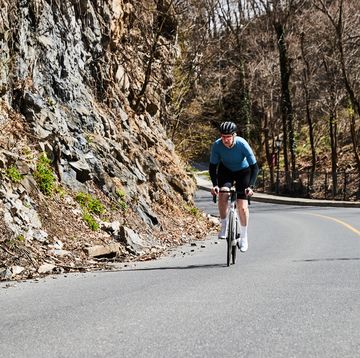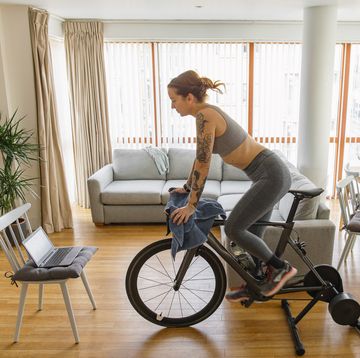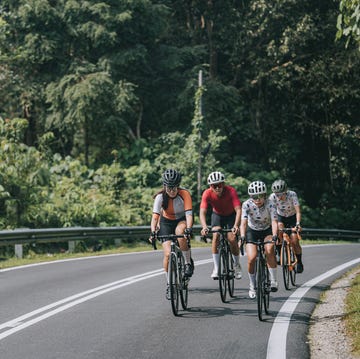The real hard finishes, sprints and uphill finishes, are hard to mimic in training. I do tons of motorpacing to match the speed, but in a race, you’re not only going fast and putting out a lot of power, you also have so many factors going on: Where the wind’s coming from, which way you’re turning up the road, where to position yourself. These all require thought process and energy, and you need this mental focus for the end of long races. What’s your off-season training like?
A lot of mountain biking, core training, and tennis. I stop my season in the middle of September and try to take three weeks totally off the bike, but that never happens. I end up doing events or promotional rides with my bike. I start structured road riding in early to mid-November with three- to five-hour rides. There aren’t many intervals in November but in December I start doing more.
Do you do core work year round?
Yes, but less during the race season. I incorporate yoga stretches, planks, and back extensions, and I’ll try to do 10 to 15 minutes, once or twice a week, as maintenance. But off-season, or in a training block between races, I’ll do a 30- to 45-minute routine four or five days a week. Do you have a favorite strength move?
No. I actually don’t like doing core, but the planks, step-ups, back extensions are all very important for overall fitness on the bike. In long climbing races, you’re in the mountains three to four hours and everything starts to hurt, your back, your neck. If you can limit that sort of pain you’re able to theoretically put out more pain on the bicycle and be more focused. How about a favorite bike workout then?
Honestly, my favorite workout is just going out and riding my bike for four hours and not doing intervals—just enjoying the climbs and scenery. But we rarely get to do that. How often do you have hard efforts?
If I’m in a training block, a minimum of four days, usually five, per week. Just three days is an easy week. How does tennis fit in?
I just like it, but I wouldn’t recommend tennis for cyclists. Do you do your own cooking?
No, my wife is actually a phenomenal chef. I’m lucky, she does 99.9 percent of the cooking. We eat wholesome foods, oatmeal, complex grains like quinoa or brown rice, food geared toward helping me recover. My favorite is ratatouille with brown rice. Has your diet changed over the years?
Yes, when I first started I ate whatever. Now I feel like I can’t get away with any junk food. The older I get, the more perfect I feel I need to get my diet. You never reward yourself?
We have pastries in the race sometimes. I love dark chocolate, I love chips, but again I don’t eat them that much. There’s always dark chocolate in the house, I like to just have a little chunk once in a while. What are your goals at the Tour de France?
Help Cadel win again. That’s my goal and priority. If something comes along where I can win a stage or get a big result, I’ll take it. But the main goal is to help Cadel win his second Tour. What’s it mean to support Cadel?
The first week is really hectic and a dangerous. It’s windy with small roads, so we’ll try to keep him out of trouble. That means finding a place in the peloton where he’s not in the wind or worried about losing time. Our focus throughout the whole Tour is to keep him in a good position, and as rested as possible for the moments he has to attack. Why do you ride on the Tour de France rest days?
It’s a way of keeping your body awake. For most people, your body goes into shutdown mode: "OK, we’ve just been racing full gas for 10 days; now we’re not riding so I guess I need to rest." So we go out and ride for two to three hours. What keeps you motivated to get in Tour-worthy shape?
My motivation changes every year, depending on my team and whether I’m going for stage wins. I signed with this small team, BMC, and two years later we’ve won the biggest race in the world. I played a big part in it and I’d like to be part of it again. I know my time is about done. I might as well give it all I can while I still can.

Matt Allyn is the features director for Bicycling and Runner's World magazines. He's run nine marathons and come heartbreakingly close to BQing three times. In addition to running and cycling, he's also covered beer for more than a decade and is a certified beer judge.

